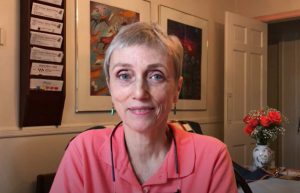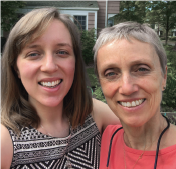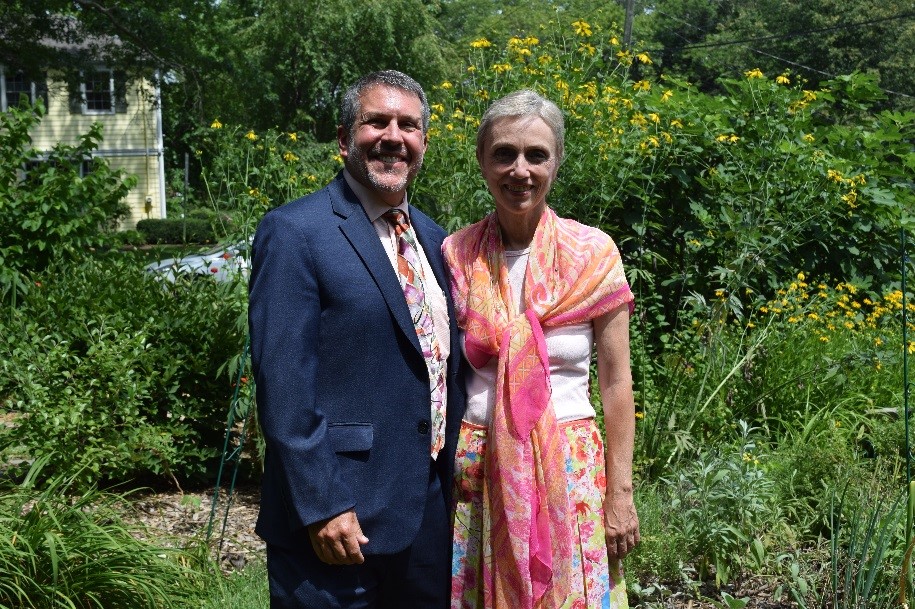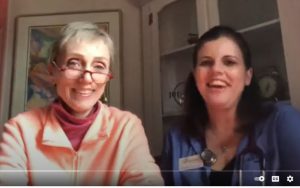

Dorothy Mullen had been “operating outside” of the traditional healthcare system for decades. The vibrant 64-year-old Princeton resident relied on alternative medicine and organic agriculture to manage the effects of heavy metal exposure that could not be treated by conventional medicine.
She even made a career out of her passion for the environment – working for years in garden-based education in the Princeton Public School District, and then running the Suppers Programs, a nonprofit organization providing education about food preparation and clean eating habits.
But in April 2019, a stage IV lung cancer diagnosis brought her life to screeching halt and suddenly back to “traditional” healthcare.
“Knowing that 50 percent of those diagnosed with stage IV lung cancer die within eight months was a sobering reality,” Dorothy explains. “I quickly knew that my treatment options were going to be more conservative, but I wanted to understand the whole spectrum of services available to me.”
Dorothy’s oncologist recommended she contact Samaritan’s Palliative Medical Partners program.
The program is designed to help patients face end-of-life decisions with dignity, with control of their destiny as far as what they want done, as much as they want done, and as little as they want done.

Dorothy connected with Stephen Goldfine, MD, a palliative care physician and Chief Medical Officer for Samaritan .
“Samaritan provides services to patients that really focus on system management as well as goals of care,” says Dr. Goldfine. “We ask patients, ‘What is important to you? and What are your goals of care?’ Our programs focus on the patient, and how we can provide an additional layer of support when they are undergoing treatment.”
Dr. Goldfine sat down with Dorothy to discuss what options were available to her.
“The hardest part of palliative care is making sure the patient understands what palliative care actually is – it’s not hospice care,” he says.
Palliative care provides lung cancer patients and all patients suffering from life-limiting illness a level of relief from their pain, symptoms, and stress.
“Oftentimes, patients get involved in the medical system without anybody asking what is important to them,” Dr. Goldfine adds. “They end up receiving care that is not wanted and that can actually cause more harm. If we look at New Jersey, about 25 percent of chemotherapy patients receive it in the last two weeks of their lives. So that chemotherapy has not made a difference to their quality of life and may have even shortened their life.”

After talking with Dr. Goldfine, Dorothy understood her prognosis and took a practical approach when it came to her diagnosis and next steps.
“It’s about being real,” she says. “I’m expressing my wishes while I am still able to do so. I think this approach helps the people in my life – my children in particular. Before they understood what stage IV lung cancer means, they were using the same vocabulary as other people – ‘beat it, fight it.’ It takes time to bring loved ones around to the idea of what this diagnosis means.”
Dorothy was pleasantly surprised at the options and services Samaritan provided her.
At Dorothy’s request, Dr. Goldfine provided care options to help ease her pain and help sustain her quality of life as long as possible, like installing a catheter to drain fluid from her chest so she could breathe easier day-to-day.
Her fears were relieved: Working with Dr. Goldfine, Dorothy had the freedom to decide what her care would look like. “The plan was to focus on my cognitive function and self-determination,” she says. “I’m still not medicating. But everything is lined up for the day when I choose comfort.”
“It wasn’t either/or – palliative care can be provided alongside curative treatment,” she says. “The whole thing was going to be goal-oriented, with a focus on my own comfort and self-determination.”
Dorothy says she has been grateful to encounter people like Dr. Goldfine as she continues to deal with her diagnosis and navigate the process.

“They are authentic. You can tell that they operate with great compassion and that their careers are also the pathway for expressing their love. I’ve had the opportunity to see people in my 64 years in all different kinds of roles in life, and I can tell you I see no greater job satisfaction than people who are helping others with these matters of end-of-life decision-making,” she explains.
Since her diagnosis, Dorothy has thrown herself into spreading the word about palliative care. She pulled out all the stops to produce a program on end of-life planning in August of 2019 that attracted 175 people.
“Learn what hospice and palliative care actually are, now, while you’re still well enough and before it becomes an urgent decision,” she urges. “Because I started palliative care early, I’ve enjoyed the full range of benefits.
Dorothy passed away peacefully in her Princeton home on March 15, 2020. Read her obituary.
To learn more about Palliative and Hospice Care click here or call Samaritan at (800) 229-8183.